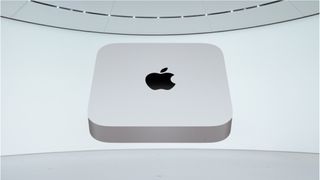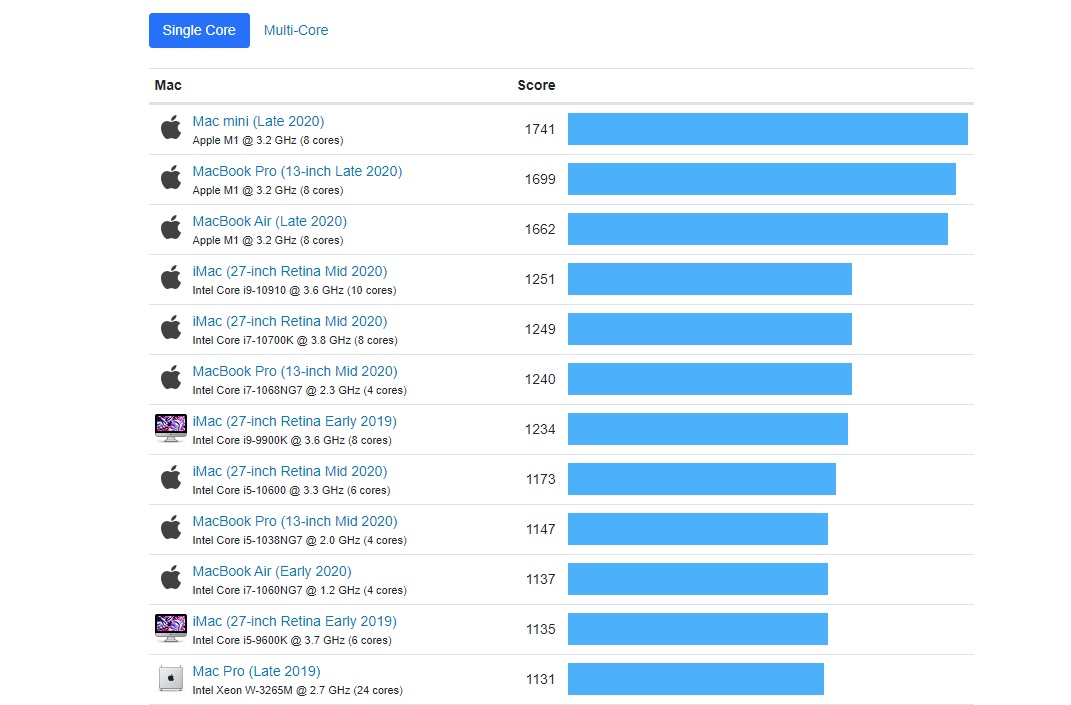Mac mini M1 benchmarks revealed — and they crush Intel
Mac mini M1 benchmarks revealed — and they crush Intel

Intel has a new fight on its hands, as new benchmarks spotted by MacRumors show how the new Apple silicon Mac mini with the Apple M1 chip can soar past Intel-based Macs.
Geekbench 5 results posted for the Mac mini late 2020 model with the M1 chip running at 3.2GHz reveal a single-core score of 1,741. The nearest Intel chip to information technology in unmarried-core performance is the Core i9-10910, a 10-core processor running at 3.6Ghz in an Apple tree iMac 2020, which kicks out a score of ane,251.
- The all-time mini PCs you lot can buy
- MacBook Air with M1 review - a computing revolution
- Just in: MacBook Air M1 benchmark results — Intel is officially in trouble
That ways a $two,699 iMac is beaten by the chip of a $699 Mac mini.
Now the sheer number of cores doesn't really come into play here, though multi-cadre performance is very important and an area where leaked benchmarks have shown the M1 also performed very well in. So single-cadre performance isn't really influenced by how many cores a CPU has. But as a lot of apps still struggle with scaling across multi-cadre CPUs, raw single-core performance is still of import.
Somewhat ironically, unmarried-cadre functioning used to be an area Intel exceeded in over main chip rival AMD. But now it looks like Intel has its piece of work cut out equally the M1 could prove to be a powerhouse in single-core, likewise as multi-core performance.
The M1 Mac Mini tops the list, followed by the Apple tree silicon MacBook Pro and Apple silicon MacBook Air, earlier an Intel-based Mac gets a await in. That'south about certainty due to the actress space in the Mac mini giving it more than room for cooling and thus better scope for the M1 to perform at higher speeds for longer.

Two things to note here: start, the benchmark is being done using machines running Apple'southward new Rosetta 2 API, which helps apps run on the new M1 chip. So some touch on Geekbench performance is expected, whether it hits the M1 or Intel fries the heaviest isn't clear.
Secondly, the Intel-powered Macs in the Geekbench v listing are stuck using 9th and 10th-generation Intel CPUs, as Apple has yet to update its Mac lineup with Intel Tiger Lake processors. However, we've put the new Dell XPS xiii with the 11th Gen Core i7-1165G7, a reasonably powerful laptop-grade Intel CPU.
Only on Geekbench 5 that Tiger Lake-based PC only delivered a single-core score of i,521, showing that Intel'south latest silicon tin can't keep up with the starting time chip from the Apple Silicon initiative. Apple Silicon sees the Cupertino company starting to transition away from Intel fries for its laptops and desktops, and instead opt for its own custom chips congenital using ARM architecture.
That means a move from the x86 architecture that'due south been the foundation for laptop and desktop processors for decades, to the RISC architecture that underpins a vast amount of smartphone and tablet chips. As such, moving to its own in-house chips is a big footstep for Apple tree and we'll accept to see whether the operation in benchmarks translates to real-earth power. This is an important point, as in that location'due south a risk that the move to RISC could throw upwardly app compatibility problems.
Still, the early signs for M1 performance are rather positive. And Apple'due south tight command over its software ecosystem means information technology'due south in a strong position to ensure macOS apps are well-optimized for M1 and whatsoever comes side by side.
Source: https://www.tomsguide.com/news/mac-mini-m1-benchmarks-revealed-and-they-crush-intel
Posted by: martinezclinking.blogspot.com


0 Response to "Mac mini M1 benchmarks revealed — and they crush Intel"
Post a Comment